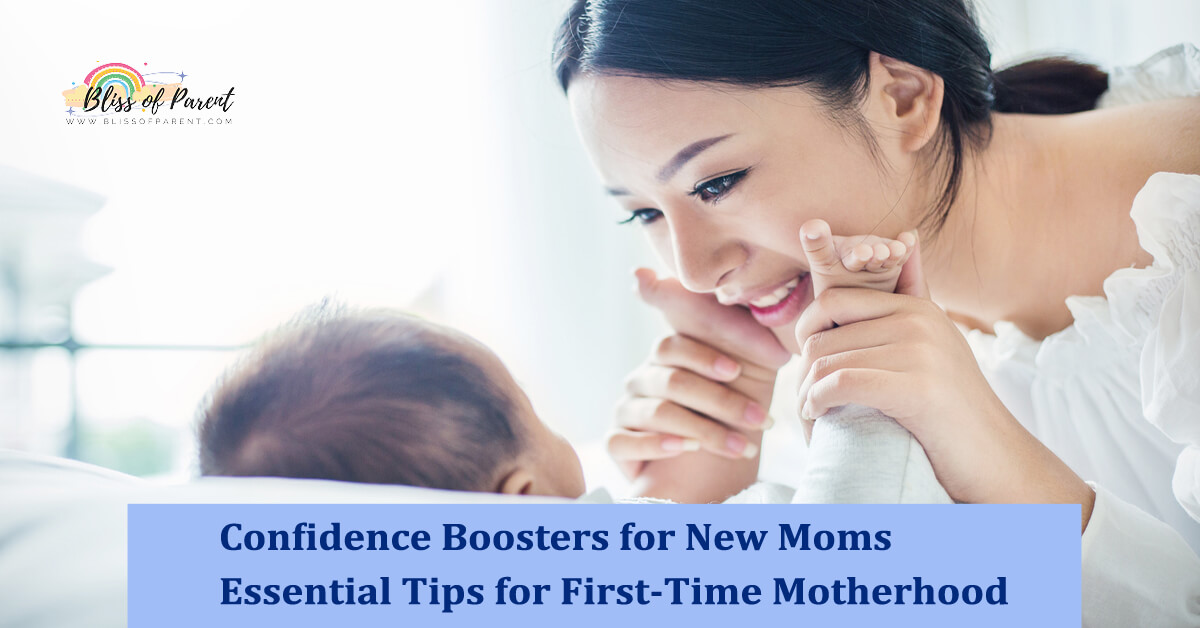For first-time moms, the journey into motherhood is an exhilarating yet uncharted adventure, filled with moments of joy, challenges, and an abundance of advice from well-meaning friends, family, and experienced mothers.
In the digital age, information flows freely from every corner of the internet, and navigating the wealth of tips and guidance available can be both a blessing and a burden. It is stated on the site of the National Library of Medicine,
“Just as the internet is becoming a growing source of health information in general, with 59% of US adults seeking health information on the internet, it is also a growing source of guidance and support for parents.”
Health information seeking by parents in the Internet age.
We’re here to guide you and gain insights to help you become the best version of yourself as a first-time mom.
Browse this Post
- 1 Section 1- Motherhood Journey Begins Before the Arrival of Baby: Tips For Upcoming Mothers
- 2 Section 2- Essential Tips for Preparing Before Your Baby’s Arrival
- 3 Section 3-Tips for New Moms Leaving Home from the Hospital
- 4 Section 4- Baby Care Tips For New Mom
- 5 Section 5- Self-Care for New Mom
- 6 Conclusion
Section 1- Motherhood Journey Begins Before the Arrival of Baby: Tips For Upcoming Mothers
The journey of motherhood begins long before the arrival of a newborn.
The decision to become a mother marks the inception of a transformative and deeply personal process, one that involves emotional, mental, and often physical preparations.
In this journey, a woman may undertake various steps and considerations, such as preparing her body for pregnancy, seeking medical advice, learning about childbirth, and exploring the emotional aspects of parenthood.
By understanding that the journey to motherhood begins well before your baby’s arrival, you can better navigate the evolving roles and responsibilities of this remarkable path.
Here are some essential tips for mothers before the birth of their child:
Prenatal Care: Regular prenatal check-ups with your healthcare provider are crucial. These visits monitor the health of both you and your baby and ensure early detection of any issues.
Healthy Diet: Maintain a balanced and nutritious diet. Focus on consuming foods rich in essential nutrients like folic acid, iron, and calcium. Avoid harmful substances, such as alcohol and tobacco.
Hydration: Stay well-hydrated by drinking plenty of water, as proper hydration is essential for the health and comfort of both you and your baby.
Exercise: Engage in safe and moderate physical activity, as recommended by your healthcare provider. Prenatal yoga, swimming, and walking are excellent choices to keep your body strong and reduce stress.
Rest and Sleep: Prioritize adequate rest and sleep. Your body is working hard to nurture a growing baby, and getting enough sleep is essential for your well-being.
Childbirth Education: Attend childbirth education classes to prepare for labor and delivery. These classes provide valuable information and techniques to manage pain and anxiety during labor.
Consider Birth Plan: Think about your birth plan, including your preferences for labor, delivery, and postpartum care. Discuss this plan with your healthcare provider.
Emotional Well-Being: Focus on your emotional health. Seek counseling or support groups if you’re experiencing anxiety or mood changes during pregnancy.
Breastfeeding Education: If you plan to breastfeed, educate yourself about the process, benefits, and potential challenges. Attend breastfeeding classes if available.

Section 2- Essential Tips for Preparing Before Your Baby’s Arrival
Setting up the nursery is the heart of a baby’s world, and preparing this space requires attention to detail. Here are some tips to create a comfortable and functional environment:
Crib and Bedding: Invest in a safe, comfortable crib adhering to safety standards. Select soft, breathable bedding and consider sleep sacks instead of loose blankets to ensure the baby sleeps safely.
Storage Solutions: Use storage bins, shelves, and organizers to keep baby essentials like diapers, wipes, clothes, and toys within easy reach.
Comfortable Chair or Glider: A cozy chair or glider in the nursery is invaluable for late-night feedings or comforting the baby to sleep.
Soft Lighting: Consider adjustable lighting, such as dimmers or soft nightlights, to create a soothing atmosphere during nighttime check-ins.
Personal Touches: Decorate the nursery with personal touches like family photos or soothing colors that can create a calm and comforting environment for both baby and parents.
New moms often find themselves inundated with options when it comes to baby gear. Here are some essential items to consider:
Stroller: Choose a stroller that suits your lifestyle—whether it’s a lightweight, compact one for urban settings or a more rugged one for off-road adventures.
Car Seat: Safety is paramount. Select a car seat meeting safety standards and ensure it’s correctly installed in your vehicle.
Baby Monitor: Consider a baby monitor with video and audio capabilities to keep an eye on your baby while they’re sleeping or playing in another room.
Diaper Bag: Opt for a spacious, well-organized diaper bag to carry baby essentials when on the go.
Baby Carrier or Sling: This can be a lifesaver for keeping your baby close and your hands free, especially during the early months.
Remember, these preparations are crucial to creating a safe and nurturing environment for your newborn. Each baby is different, so adapt your surroundings as needed and always prioritize safety.
Section 3-Tips for New Moms Leaving Home from the Hospital
Leaving the hospital with your newborn is the start of an incredible journey. By acknowledging your emotions, ensuring your baby’s safety, and reaching out for support, you’re taking the necessary steps to make this transition as joyful as possible.
Enjoy every moment as you begin this excellent adventure of motherhood. Here are some valuable tips for new mothers as they make the transition from the hospital to their home:
Embrace Your Emotions: Allow yourself to feel the full spectrum of emotions that come with becoming a new mother. It’s entirely natural to have mixed feelings. Talking about your emotions with your partner can be comforting and validating.
Connect with Your Partner: Share your thoughts and feelings with your partner. This can be a bonding experience and help both of you navigate the journey into parenthood together.
Baby Snuggles: Those early moments of snuggling with your baby are precious and can work wonders for your spirits. Enjoy these bonding moments as you prepare to leave the hospital.
Safety First: Prioritize your baby’s safety during the drive home. Ensure that your baby’s car seat is correctly installed in your vehicle well before your due date. Familiarize yourself with your state’s car seat safety regulations.
Practice and Test: Before leaving, practice securing your baby in the car seat. Ensure that the harness is snug and secure and that your baby is comfortably positioned.
Test the car seat in your vehicle or taxi to ensure it is securely installed and free from any movement.
Pack Essentials: Before leaving, double-check that you have all the essentials for your baby’s journey home, including diapers, baby clothing, blankets, and any required baby care items.

Section 4- Baby Care Tips For New Mom
Navigating the journey of motherhood is an adventure filled with learning and growth. As a new mom, it’s essential to give yourself grace and time to adapt to your new role while cherishing the precious moments with your baby.
Caring for a newborn can be an exciting yet challenging experience for a first-time mom. Here are some essential baby care tips to assist new mothers in nurturing their little ones:
1. Bonding and Skin-to-Skin Contact-
Kangaroo Care: Practice skin-to-skin contact to foster bonding, regulate the baby’s temperature, and promote breastfeeding.
Eye Contact and Talking: Engage in eye contact and talk to your baby to encourage emotional connection and aid their development.
2. Feeding-
Breastfeeding Support: Seek guidance from lactation consultants or nurses to ensure proper latching and comfortable feeding positions.
Bottle-Feeding Techniques: If using bottles, hold your baby close and ensure they’re upright while feeding.
3. Sleep and Safe Sleeping Environment-
Back to Sleep: Place your baby on their back to sleep to reduce the risk of Sudden Infant Death Syndrome (SIDS).
Comfortable Sleep Space: Create a safe and comfortable sleep environment with a firm mattress and no loose bedding or toys.
4. Diaper Changing and Bathing-
Diaper Changing Hygiene: Change diapers frequently, ensuring the diaper area is clean and dry to prevent diaper rashes.
Bathing Basics: Use a mild baby-specific soap and shampoo, and remember not to bathe your baby daily as their skin is sensitive.
5. Crying and Soothing Techniques–
Comforting Methods: Gently rock, sway, or sing to soothe a crying baby. Pacifiers or swaddling can also offer comfort.
Calm Environment: Ensure a calm and peaceful environment; babies may get overstimulated easily.
6. Baby’s Health and Well-being-
Doctor Visits: Keep up with scheduled doctor appointments and vaccinations.
Signs of Illness: Learn signs of illness or distress in infants, such as fever, lack of appetite, or unusual fussiness.
7. Establishing Routines-
Consistent Schedule: Babies thrive on routine; establish feeding and sleeping schedules to help them feel secure.
Patience and Flexibility: Be patient and flexible as you adapt to your baby’s needs and changes in their routine.
10. Trust Your Instincts-
Every Baby is Different: Trust your instincts as a mother and remember that every baby is unique. What works for one might not work for another.
Read more: Newborn Guide For New Parents: An All In One Guide
Section 5- Self-Care for New Mom
Self-care and boosting confidence are fundamental to maintaining physical, emotional, and mental well-being for new moms. The journey of motherhood can be demanding, and taking care of oneself is crucial for the mother’s physical and mental health.
Throughout this resource, we’ll explore a range of practical, emotional, and mental strategies that can boost your confidence as a new mother. Here are some essential self-care tips for new moms:
Practical Strategies For Boosting Confidence Of New Moms
Boosting your confidence as a new mother involves a combination of practical strategies that help you navigate the challenges of motherhood. Here are some practical tips to boost your confidence:
Educate Yourself: Knowledge is empowering. Take parenting classes, read books, and seek reliable sources of information to learn about child development, infant care, and parenting techniques. Understanding what to expect can boost your confidence.
Self-Care: Prioritize self-care, including getting enough rest, maintaining a healthy diet, and engaging in activities that bring you joy. Taking care of your physical and mental well-being is essential for building confidence.
Plan and Prepare: Organize your daily routines and create a schedule that works for you and your baby. Having a plan can reduce the feeling of chaos and boost your confidence in managing your new responsibilities.
Accept Help and Delegate: It’s okay to accept help from others and delegate tasks. Let your partner, family members, or friends take on some of the household chores and childcare responsibilities, giving you a break and some much-needed rest.
Stay Informed About Self-Care: Learn about postpartum self-care and prioritize it. Make time for rest, relaxation, and activities that bring you joy. A healthy, confident mother is better equipped to care for her child.
Stay Connected with Your Partner: Communicate openly with your partner about your needs, feelings, and experiences. A supportive partner can be a significant source of confidence and reassurance.

Emotional Strategies for Boosting Confidence for A New Mom
Motherhood can be emotionally challenging, so developing strategies to manage feelings and enhance emotional well-being is essential. Here are some emotional strategies to boost the confidence as a new mom:
Practice Self-Compassion: Be kind and patient with yourself. Understand that it’s okay to make mistakes as a mother and have moments of self-doubt.
Embrace Imperfection: Recognize that perfection is an unrealistic goal. Embrace the imperfections of motherhood as a part of the journey. You don’t have to do everything flawlessly, and that’s perfectly normal.
Share Your Feelings: Openly communicate with a trusted friend or family member about your emotions. Sharing your feelings can provide a sense of relief and validation, helping you process your experiences.
Journaling: Keeping a journal can be a therapeutic way to express your thoughts and emotions. Write about your daily experiences, your joys, your challenges, and your aspirations. It can help you gain clarity and insight.
Mindfulness and Meditation: Practice mindfulness and meditation to stay in the present moment and reduce stress. These techniques can help you manage anxiety and build emotional resilience.
Positive Affirmations: Create positive affirmations that remind you of your strengths and capabilities as a mother. Repeating these affirmations daily can boost your self-esteem.
Accept Compliments: When others acknowledge your good parenting or praise your baby, accept these compliments gracefully. It can improve your self-esteem and boost your confidence.
Stay Informed: Learn about the emotional changes that occur during postpartum, and know that fluctuations in mood are common. Educating yourself about these changes can help you navigate them more confidently.
Celebrate Achievements: Acknowledge your accomplishments and milestones as a mother, no matter how small they may seem. Celebrate your resilience and adaptability in the face of challenges.
Practice Stress-Reduction Techniques: Develop healthy coping mechanisms for dealing with stress. Exercise, deep breathing, and spending time in nature can be effective ways to manage stress and maintain emotional well-being.
Seek Professional Support: If you’re struggling with persistent feelings of sadness, anxiety, or other emotional challenges, don’t hesitate to seek help from a mental health professional. Therapy can be a valuable resource for emotional support and guidance.
Remember that your emotional well-being is closely linked to your overall confidence as a new mother.
By prioritizing self-compassion, emotional self-care, and open communication, you can better manage the emotional ups and downs of motherhood and enhance your self-assuredness as a parent.

Boosting Confidence for New Mothers with Mental Strategies
Boosting your confidence as a new mother also involves adopting effective mental strategies to manage your thoughts and mindset.
Your mental outlook can significantly influence your perception of motherhood and your overall self-assuredness. Here are some mental strategies to boost your confidence:
Positive Self-Talk: Challenge negative self-talk and replace it with positive affirmations. When self-doubt creeps in, remind yourself of your strengths and past successes as a mother.
Set Realistic Goals: Break down your parenting goals into manageable, achievable steps. This approach can help you focus on small victories and build your confidence incrementally.
Practice Gratitude: Regularly express gratitude for the positive aspects of motherhood. A gratitude journal or daily reflection can help shift your perspective toward the joys of parenting.
Visualize Success: Use visualization techniques to picture yourself as a confident and capable mother. This can help reframe your self-image and boost your self-confidence.
Accept Change: Recognize that motherhood is a journey of personal growth. Embrace the changes and uncertainties that come with it, understanding that you’re evolving as a person and parent.
Stay Informed: Stay informed about the developmental stages and needs of your child. Knowledge can empower you to make informed decisions and feel more confident in your parenting choices.
Learn from Mistakes: Rather than dwelling on mistakes, view them as valuable learning opportunities. Analyze what went wrong, adjust your approach, and move forward with newfound wisdom.
Seek Feedback: Don’t hesitate to ask for feedback from experienced parents or professionals when encountering challenges. Receiving constructive input can help you refine your parenting skills.
Manage Comparison: Avoid comparing yourself to other mothers. Every family is unique, and what works for one may not work for another. Focus on your child’s individual needs and your own strengths.
Time Management: Efficient time management can alleviate feelings of overwhelm. Create a daily schedule that allows you to balance childcare, self-care, and other responsibilities.
Practice Self-Reflection: Regularly take time to reflect on your parenting journey. Journaling can be a helpful way to assess your thoughts, feelings, and experiences, allowing you to identify areas for improvement and growth.
Stay Adaptable: Be open to adjusting your parenting approach as your child grows and changes. Adaptability is a crucial mental skill in confidently navigating the various stages of motherhood.

Remember that developing mental strategies takes time and practice.
Be patient with yourself as you work to enhance your confidence as a new mother, and always remember that self-assuredness in motherhood is a journey, not a destination.
Read more: Do’s and Don’ts for Cruising With a Baby.
Conclusion
The journey into motherhood is a profound and transformative experience marked by both joys and challenges. Boosting your confidence as a new mother requires a multifaceted approach, encompassing practical, emotional, and mental strategies.
From staying informed and setting realistic expectations to seeking support and nurturing self-compassion, these strategies empower you to navigate the intricacies of motherhood with grace and self-assuredness.
As you embrace the role of a new mother, remember that every mother’s journey is unique, and your love and dedication to your child are powerful forces that will guide you through the ups and downs of parenthood.
Read More
How Do I Take My 4-Month-Old To The Beach?
12 Crucial Things Grandparents Need To Know
Where Is The Baby Care Center In Disneyland
My name is Olivia Brown, and I’m a New York-based blogger and stay-at-home parent. Former business executive enjoying retirement and time with kids Lily and Max. On my blog, I review things for kids and offer my honest thoughts and insights to other parents who may be having the same or similar experiences.





